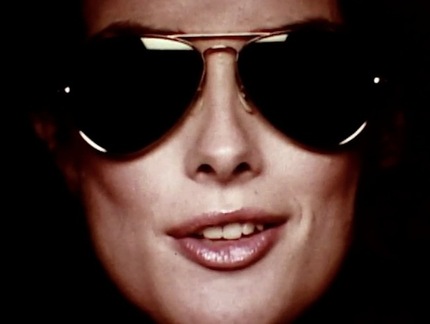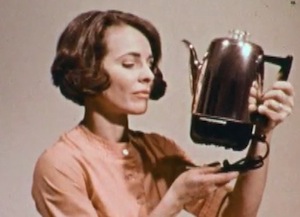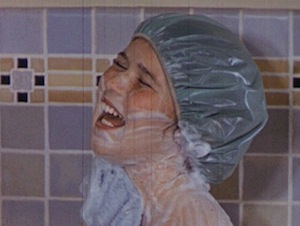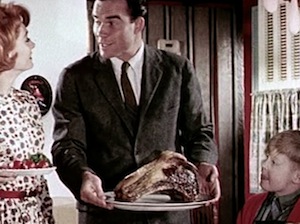An Interview With Rob Parrish, Creator Of The Web Series NEXT TO HEAVEN

The journey begins in the digital dig sites of the public domain. Seen by some as multimedia garbage dumps, for others these are full-on treasure troves of pop culture whats-its and b-movie rejects lost to the loose copyright laws of yesteryear. It is in this world of found footage filmmaking where the website Archive.org stands like an ancient library; a wonder at the pillars of this www.earth. It is here that Parrish excavates the best shots, the most out-there moments -- whether it be from a 50s education film or a Saturday Morning commercial, it's all fair game. And then, with a witty pen in hand and trusty Mac at his side, he takes these pieces and reshapes them into a new 2-3 minute short film. He does this every week. This is Next to Heaven -- a web series geared to the art house set as much as to the genre crowd. In short: an unintentional love letter to the readers of ScreenAnarchy the world over.
Though we both live in the Washington D.C. area, Parrish and I decided that a Skype interview might work best schedule-wise. Little did we know that this new-fangled technology would have its way with us. Luckily, our good friend the telephone was there to help when the interwebs failed. What follows is a couple of schmucks gabbing about cinema, which is, uh, nothing new for this site, but as you will see, Rob Parrish is most certainly one of a kind.
I always like to start out and ask about "origins". Was there a moment for you or a film that you saw where you went "a-ha!" and decided that filmmaking was something you were going to pursue in some fashion.
Back in the late 1990s I'd almost landed a deal to direct a feature film that I also wrote. It was a crime picture with a transgender slant and an alien invasions subplot. Anyway, I had some differences of opinion with one of the producers, and let's say it got a bit heated. Anyway, the producer died and I was convicted of man slaughter. So, the movie deal fell through and I was sentenced to 10 years in prison. Now, in prison they don't let you have a movie camera. But I still wanted to create. During my weekly computer time I was able to download public domain films from Archive.org and from that found footage make small personal films about the difficulties and unexpected joys of life on the inside. They were popular with my peers (the ultimate niche audience I suppose), and finally got the attention of the warden. He arranged for a screening and then I was allowed to go on tour with the films. I was surprised at how many prisons and jails have top notch projection equipment. Anyway, I'm pretty sure the film thing was a factor in my early release.
Okay, you just wrote a Next To Heaven episode with that answer . . . right?
Yes, all a lie. Well, except for the truth of it. I had limitations of time, I wanted to tell stories, Archive.org came along, and Next To Heaven was born.
Well, my introduction to Next to Heaven was just a few months back through a piece that Bad Lit: The Journal of Underground Film ran on the episode "Judy's Smile", which after watching the whole series, is still my favorite. It just got accepted into a festival, so a lot of people seem to dig it.
Yes, I like that one too. I was actually trying to channel William Burroughs in the voice over. It's a god awful impersonation of Burroughs, which is good, because I didn't really want it to be Burroughs. And that's the thing with the project... because I make one every week I'm forced to try things out and then let them go. So, the quality is going to be uneven, but that's OK. And then once in awhile you make a really good one. But the really good one stands on the shoulders of the earlier ones that weren't as good. So you make, and you put it out there and let the chips fall wherever. It's the age of no privacy; why not put your sketch book online.
 A couple weeks back I started watching the television show, The Wonder Years again... So I watched an episode of that and soon after went and watched Next to Heaven and I was like, "wait a minute! What Rob is doing almost feels like this very bizarre and twisted version of the adult Kevin Arnold thinking back and narrating his life!" So there's that nostalgic quality to NTH, but there's also that very sardonic, droll nature with the way a joke comes together or a memory resurfaces. One episode that stands out for me is "For Steve", where a man is recalling a lover he had in the late 60s; a woman who loved her gadgets. They intrigued her and aroused her. To me that was one of those bizarre but believable stories, one that you'd perhaps encounter an older gentleman recalling at a dinner party or a wedding. So, there is a magic to watching the show, being amazed at how this collected footage has come together to tell a new story, present a new joke. I imagine that finding all this and putting it together is very exciting for you...
A couple weeks back I started watching the television show, The Wonder Years again... So I watched an episode of that and soon after went and watched Next to Heaven and I was like, "wait a minute! What Rob is doing almost feels like this very bizarre and twisted version of the adult Kevin Arnold thinking back and narrating his life!" So there's that nostalgic quality to NTH, but there's also that very sardonic, droll nature with the way a joke comes together or a memory resurfaces. One episode that stands out for me is "For Steve", where a man is recalling a lover he had in the late 60s; a woman who loved her gadgets. They intrigued her and aroused her. To me that was one of those bizarre but believable stories, one that you'd perhaps encounter an older gentleman recalling at a dinner party or a wedding. So, there is a magic to watching the show, being amazed at how this collected footage has come together to tell a new story, present a new joke. I imagine that finding all this and putting it together is very exciting for you... Oh absolutely, it's a very fun process. One of the nicest things written about the show was from Karina Longworth. She said, and I'll paraphrase, that in spite of the artificiality and the clear fakeness of the construct she would forget she was watching a manipulation until the point she started laughing out loud. If I can give a viewer that kind of experience once in a while I'm doing all right.
So tell me a bit more about your process.
Half of this season I wrote in one fell swoop during some time at the beach. I brought twenty-five or thirty films from Archive.org. I pick them semi-randomly -- I punched some keywords into Archive, look at the thumbnails and pick the ones that look like they might be fun. So I have a library of film to watch. Sometimes the story jumps right out of them. It's like "well there it is. That's the thing." And then other times it's just an image that you like -- "I want to do something with that!" But, you don't' know what. And then other times a particular movie will just sit in the back of my mind for weeks, and then I have one of those in-the-shower moments like, "oh I know what to do with that one now!" So it's in the shower or it's on a walk, and that's the nice thing about it -- you've just got this hunk of material always in your head, and some of them trigger something, and others don't. Usually the best ones, there's something immediately in them that you go "yeah." And "Judy's Smile" was like that, when I watched that... it was a hygiene film, and the little girl, the actress, was clearly trying to smile continuously, for whatever reason, you know... she wasn't getting good direction I guess. It just seemed a little absurd, like no matter what she was doing she was smiling. Even the shot where she's washing her face and you can see she's getting soap in her mouth, but she's still smiling, she's still happy -- happy to be clean!
I just thought that was hilarious.
 Another thing that jumped out is the color in [the original footage] is really quite lovely, and that's an element too. Often these old films are just physically beautiful, and it is a thrill to be able to pull them out and re-contextualize them... make at least parts of the films available for people that aren't weirdos like me that are happy to sit and watch these films for hours on end. I can kind of call out the best images from these lost/discarded films, but then of course I do my own contribution in crafting a new story out of it. So with Judy she's getting soap in her mouth because she's smiling, and then it's a short skip to "how would a little brother react to a sister who is just continually cheery" -- You know even a nice feeling when you get hit with it constantly can start to hurt after awhile, so it definitely pushed the wrong button in [the brother's] head.
Another thing that jumped out is the color in [the original footage] is really quite lovely, and that's an element too. Often these old films are just physically beautiful, and it is a thrill to be able to pull them out and re-contextualize them... make at least parts of the films available for people that aren't weirdos like me that are happy to sit and watch these films for hours on end. I can kind of call out the best images from these lost/discarded films, but then of course I do my own contribution in crafting a new story out of it. So with Judy she's getting soap in her mouth because she's smiling, and then it's a short skip to "how would a little brother react to a sister who is just continually cheery" -- You know even a nice feeling when you get hit with it constantly can start to hurt after awhile, so it definitely pushed the wrong button in [the brother's] head. And that's where you get that little twist at the end there, picking up the thread of them as adults.
Yes, endings. They can be hard, especially in a film that runs 2 or 3 minutes. I didn't know how to finish Judy off at first. Then, I keyed on the shot of the Mother ... after the brother bathes, Mommy puts him through an inspection, you know looks at his hands and behind his ears, and all that. So then it definitely conjured up an image of an over clean household and what kind of psychological issues that could entail... if your mother was always kind of checking you for how clean you were. So that twisted-ness of it was kind of ready-made. It often is, it's right there for the plucking, because some of these films are already weird, mediated versions of reality, where things are stretched out of shape to start with.
One episode that seems ready-made, is the one where a grownup son recalls his mother winning the lottery and how she then changed the kitchen every month with the winnings. That raw footage you pointed me to was just this filmed expo of all these different styles of kitchens from around the world...
That one is called "Winner" and was made from a pretty hilarious bit of corporate propaganda called "Out of this World" from the good folks at Frigidaire (a Division of General Motors). Basically, the bored housewife is fantasizing about all different styles of kitchens she might have in the future. So, I loved it. But then the challenge becomes "what is the story? Why is the woman doing that and who is the narrator?" So those are the kinds of choices you make -- how do you take those images and build it. My favorite movie is Fellini's 8 1/2. Sometimes I fancy that the characters in NTH are extras in Fellini movies of another reality. These are the stories that don't get told in the main movie, but are situated in the background.
 One thing I find really interesting doing the project is no matter how far afield the images happen to be from my own particular concerns... once you start writing the story... the story comes out in things I'm interested in. They kind of tap stuff that's milling around in the subconscious, so even though in the case with ones with archive footage -- I didn't generate any of the images -- they tend to lead me to tell stories that feel particular to my interests and the way I look at the world. The original films are like a Rorschach test. Maybe we should have a contest where everyone makes a NTH episode from one particular archive film. I'm sure we'd see many different stories and approaches.
One thing I find really interesting doing the project is no matter how far afield the images happen to be from my own particular concerns... once you start writing the story... the story comes out in things I'm interested in. They kind of tap stuff that's milling around in the subconscious, so even though in the case with ones with archive footage -- I didn't generate any of the images -- they tend to lead me to tell stories that feel particular to my interests and the way I look at the world. The original films are like a Rorschach test. Maybe we should have a contest where everyone makes a NTH episode from one particular archive film. I'm sure we'd see many different stories and approaches.Indeed. There are themes that I've seen emerge in the episodes over time. Whether it's the relationship between siblings, or the relationship between parents and children, or romantic relationships... that's a big thing... how people deal with those strange eccentricities; how people deal with perception and of another person. Now in regards to the found footage versus you shooting your own stuff, it seems like recently there have been more episodes that incorporate your own footage. Should we be expecting a lot more of that down the line?
In the last ten or so weeks [of the season] there will probably be at least two that I've got going. But, you know that's limited by the issue that got the whole thing started. It takes a lot more time to get actors together and do a shoot. It's a much bigger commitment of time and money to make those. As much as I love the [found] footage I started out as a regular filmmaker. I went out and bought myself a new Canon T2i about a year and a half ago, so now I'm able to shoot HD and that's very exciting. Now, I like to edit more than I like to shoot, but it is exciting to edit your own footage, and make your own imagery. This season is almost over so there will certainly be a hiatus and then I've got a couple of shorts already written that I'll make. So during the interim I'll probably make those, try to do the festival thing depending on how they turn out. And you know I also have in the back of my mind -- I don't know where I'm going to find the time -- I'd like to do something that has a more typical narrative arc. A series of ten or twelve episodes that tells a story, kind of a mini-feature, but that still has the Next to Heaven aesthetic. I should mention that I'm obsessed with Breaking Bad. The look of that show and its approach to plot is so f'ing great. So once Next to Heaven is over I'll start that process. I think writing a compelling longer arc is harder than working off the found footage, which is almost like an exercise. Of course if I reject everything I come up with that's not as good as Breaking Bad ... well, then there won't be a new show from me ... ever. (Laughs)
Talking about short films and future projects, you did just recently have a short, "A B C", play at the D.C. shorts festival.
That was the 4th time at D.C. Shorts, so I really love the festival, and having gotten in that many they must like me too. I sound like Sally Field! Anyway, you can see "A B C" online as a NTH episode. I gotta say: if you've got a short film it's a great festival to enter. The filmmakers are treated really, really well. They have really terrific parties. They find housing for out-of-state people. This year was really heavy with people from LA. One guy I met, he said "I just needed a vacation, so I entered this.." and the festival provided him with housing. He stayed with a nice old lady that he really hit it off with, and it was his vacation. It's a good one, he had a great time!
So if you're a filmmaker and you need a vacation, D.C. Shorts will provide that, and you'll also get to screen your short at their festival.
Absolutely, absolutely. And you know you get to go to the museums and go to the parties and meet folks; it's a lot of fun. Of course, you need to make a good movie too. So, no free lunch, really.
Right, so basically we've just turned the interview into an advertisement for the D.C. tourism board or whomever...
That's right! Come to D.C.!
Come to our grand city.
Help us with our tax base. Come on, filmmakers. Come on to D.C. (We both laugh)
-------
Catch every episode of Next to Heaven at nexttoheaven.net. Below: the latest, an appropriately Halloween themed collaboration between Parrish and Maurice Martin, which gives a voice to the zombie hunting militia from the original Night of the Living Dead.

Do you feel this content is inappropriate or infringes upon your rights? Click here to report it, or see our DMCA policy.






